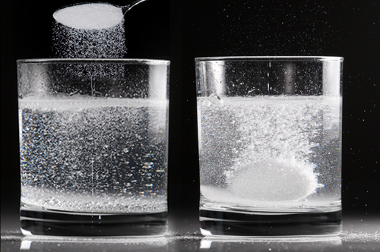There are four main factors that change the speed of reactions, see what they are:
1-Contact surfaceO:The larger the contact surface, the faster the reaction.
This is because reactions take place between the molecules that sit on the surfaces of the reactants. They perform collisions that, if effective (with correct orientation and with the amount of energy necessary), will result in the breaking of old bonds and formation of new ones, that is, the chemical reaction will occur. Therefore, the larger the contact surface, the more molecules are in contact with each other, the more likely it is that effective shocks will occur, and the faster the reaction.
An example that confirms this is if you react with the same amount of water a whole effervescent tablet and a crushed one. Which will end up reacting faster? The answer is the crushed tablet, as its contact surface is much larger than that of the compact tablet.

Reaction between effervescent antacid and water in two different situations: in the first glass, the antacid is powdered; in the second, it's in tablet
2- Temperature:The higher the temperature, the faster the reaction will be.
This happens because, with the increase in temperature, the kinetic energy of the molecules of the reacting substances increases, that is, they move at a higher speed, which increases the amount of effective shocks that result in a more fast. Also, as the energy of the molecules increases, this allows them to have enough energy to react, which is called activation energy.
For example, when a fire occurs in a forest, which is a medium where heat loss is small, the reaction releases heat into the medium. As a result, the temperature of the environment increases and this makes the combustion reaction occur even more quickly.

The increase in temperature further increases the speed of forest fires
The pressure cooker is also used for this purpose, as the increase in pressure increases the temperature at which the liquid boils and, consequently, the faster the cooking of the food.

The pressure cooker is an example of the influence of temperature on the reaction rate
On the other hand, if we want a reaction to proceed more slowly, we can lower the temperature. It is the case of putting, for example, meat in the freezer, because the low temperature makes this food decompose more slowly.
3- Concentration:The greater the concentration of reactants, the greater the reaction rate.
When we increase the concentration of reactants, we increase the number of reacting molecules or particles per unit of volume and, consequently, the number of collisions between them increases, resulting in a faster reaction speed.
An example is coal combustion. If we put a piece of red-hot coal into a flask of pure oxygen, the reaction will proceed much faster. This is because the concentration of one of the combustion reactants (oxygen) has increased. Before, oxygen was present in the air, which is in a proportion of about 20%. Inside the bottle, however, this proportion goes to 100%.
4- Catalysts: They are substances that increase the speed of certain reactions without participating in them, that is, without being consumed during the reaction.
For example, hydrogen peroxide decomposes over time, but when it is brought into contact with the blood of an injury, this reaction occurs with a much greater speed, which is seen through the formation of bubbles.
This happens because the blood has an enzyme called catalase that works as a catalyst for the hydrogen peroxide decomposition reaction, that is, it increases its speed.
Catalysts are able to increase the speed of reactions because they act by changing the reaction mechanism by decreasing the activation energy of the reaction. Thus, with a smaller amount of activation energy, it is easier for the reacting particles to reach this energy and react.
Better understand how this happens by reading the text How Catalyst Substances Work.
There are other factors that can interfere with specific reactions. Some examples are: light,electricity, pressure (in the case of gaseous systems) and nature of reagents (The greater the number of reagent bonds that need to be broken and the stronger they are, the longer the reaction will take).
By Jennifer Fogaça
Graduated in Chemistry
Source: Brazil School - https://brasilescola.uol.com.br/quimica/fatores-que-alteram-velocidade-das-reacoes.htm
